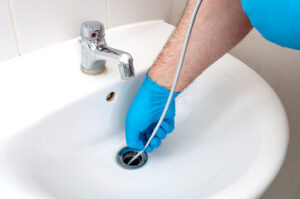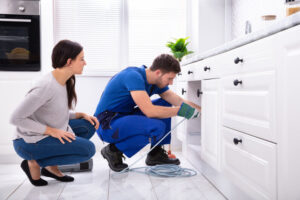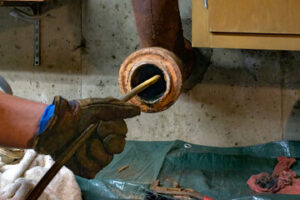Plumbers install and repair pipes that carry water and waste to and from homes and businesses. They often work with other contractors to ensure that plumbing systems are integrated properly into construction projects. For more information, Click Here to proceed.
Plumbers must have the physical stamina and skill to work in tight spaces and lift heavy tools. They also need to be comfortable interpreting blueprints and understanding building codes.

A plumbing system is essential for a building, as it takes away waste water, regulates indoor climate, and delivers hot and cold water through pipes, faucets, and other fixtures. Plumbers install these systems in new buildings or repair and maintain existing ones. They work with various materials and must have excellent spatial awareness to navigate tight spaces. They also need critical thinking skills to weigh options and physical strength to perform manual labor.
The main job of a plumber is to ensure the proper installation and operation of pipes and other plumbing components in residential and commercial buildings. This includes laying the foundation for drainage systems, installing taps, toilets, and other fixtures, and connecting them to the main pipes. In addition, plumbers may be called on to inspect and test the pressure levels of existing pipes and make necessary repairs.
Another service offered by plumbers is unclogging drains and sewer lines. They use specialized tools to remove obstructions from the pipes and restore the water flow. They are also trained to handle gas line installations and repairs. Plumbers must have a high school diploma or equivalent and undergo extensive on-the-job training, usually lasting four to five years. They are also required to have a license to practice in their field.
One of the most important traits of a plumber is communication skills. They must be able to listen to customers and explain their problems clearly. This helps them determine the best course of action to take. Additionally, plumbers must be able to read and understand blueprints.
Plumbers often work in confined spaces, such as crawl spaces and basements. They must maneuver through these areas without damaging any pipes or fixtures. Plumbers also need to interact with customers frequently to discuss their services and provide estimates.
Moreover, a plumber must know about the latest plumbing technologies and innovations. This helps them offer their clients the most efficient and cost-effective solutions. In addition, a plumber should be able to work well under pressure and meet deadlines.
Plumbers repair and maintain the pipes, fixtures, and appliances that facilitate water supply, drainage, and sewage in residential and commercial buildings. Their work requires attention to detail and physical stamina to maneuver in tight spaces and lift heavy tools. They must also be competent at troubleshooting and able to diagnose problems based on their clients’ descriptions and inspections.
A common type of plumbing repair is fixing leaks. This can be caused by worn washers or gaskets, corrosion of the fixture or pipe, or just age and wear. When a leak occurs, it can cause significant damage to the home. Plumbers use various tools to locate and repair the leak, including electronic devices that detect water leaks.
Another common repair service is replacing water filters. This is important because it helps to ensure that the water coming into a home or business is clean and healthy. A faulty filter can allow dirt, debris, and chemicals into the water supply, leading to health issues for the inhabitants. Plumbers install and repair shower heads, faucets, toilets, and other household appliances.
Leak detection is a common service offered by plumbers, and it is a good idea to have this done regularly to prevent costly repairs in the future. Plumbers can use specialized equipment to check for hidden leaks in walls, floors, and ceilings. They can also use special cameras to inspect sewer lines for blockages and other problems.
Plumbers specializing in maintenance services often offer homeowners monthly or yearly maintenance plans. These plans can include routine tasks like checking for clogs, examining water pressure, and ensuring that all fixtures work properly. This type of maintenance can help keep homes and businesses safe and running smoothly and save owners money on utility bills. When hiring them for a job, asking prospective plumbers about their maintenance plan options is a good idea.
In addition to installing and repairing plumbing fixtures, some plumbers offer maintenance services. This can include examining pipes to ensure they are not leaking or blocked and cleaning drains to prevent backups. It also includes reading blueprints to determine the location of plumbing fixtures and pipes, ensuring they comply with building codes and regulations. Plumbers specializing in maintenance may also prepare cost estimates for clients and perform routine inspections to identify potential issues before they become major problems.
Plumbers may work on larger-scale systems such as water supply lines, drainage systems, and fire sprinklers in large commercial and industrial buildings. These plumbers frequently collaborate with engineers and construction teams to seamlessly integrate plumbing systems into new buildings. They also may repair or maintain existing plumbing equipment such as water heaters, kitchen sinks, toilets, and showers.
A career as a plumber can be very rewarding. In addition to being a well-paying profession, it offers excellent job security and flexibility. Many plumbers are self-employed and can choose their projects, hours, and pay rates. However, plumbing can be dangerous, particularly when working on sewer pipes or septic systems. There is a risk of exposure to hazardous materials and biohazards, physical injury from manual handling, and prolonged exposure to sunlight or heat.
Choosing the right path to becoming a plumber depends on your personal and professional goals. Plumbing may be your ideal career choice if you enjoy working with your hands and have a knack for solving problems. However, it’s important to understand the requirements of each state and municipality before you pursue your license. New York, for example, requires all plumbers to pass an exam and have at least four years of experience. In addition, most plumbers complete an apprenticeship program that combines classroom instruction with paid on-the-job training. This type of program can take 4-5 years to complete.
In addition to repairing and installing plumbing fixtures, plumbers also provide customer service. This includes educating customers on best practices to avoid plumbing issues and providing information about pricing and availability of services. To build a strong client base, excellent customer service skills are essential for plumbers. Good customer service can lead to repeat business and referrals, vital to any plumbing company’s success.
Plumbers must be able to listen to their customers and explain complex issues in simple terms. They must be able to answer questions about the price of services, available options, and timeframes for completion. They must also be able to schedule appointments at convenient times for their customers and show up on time.
Additional responsibilities of plumbers include performing inspections to check for any water leaks or violations of building codes. This may involve using video cameras to inspect pipes, pressure gauges to test for leaks, and other specialized tools. Plumbers must also be able to read blueprints and understand construction procedures.
While most plumbers focus on major installation projects, some specialize in maintenance and smaller jobs like unclogging drains or fixing faucets. This can help them earn more money per job and increase their productivity. Adding maintenance packages can also offer a more comprehensive range of services.
Plumbers should be prepared to work unsociable hours, as emergencies happen at all times and not just during normal business hours. They must be able to work evenings and weekends to address these urgent requests, which can impact their personal lives. Moreover, plumbers must be willing to learn new skills and technologies as the industry evolves.
Many plumbers are forced to leave calls unanswered or send them to voicemail after office hours. Plumbers can be assured that their calls will be handled professionally even after business hours by partnering with a contractor call answering service, such as MAP Communications. Our agents are trained to ask the right questions and send critical information to the on-call plumber so that they can arrive at the scene quickly to resolve the issue.



